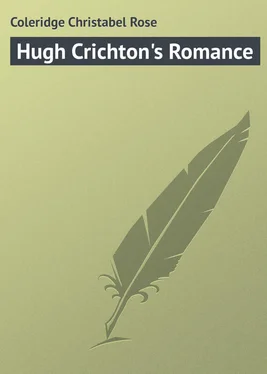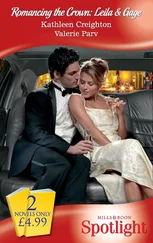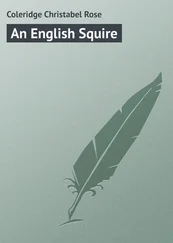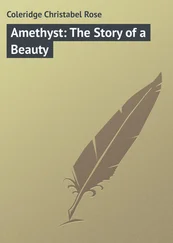Christabel Coleridge - Hugh Crichton's Romance
Здесь есть возможность читать онлайн «Christabel Coleridge - Hugh Crichton's Romance» — ознакомительный отрывок электронной книги совершенно бесплатно, а после прочтения отрывка купить полную версию. В некоторых случаях можно слушать аудио, скачать через торрент в формате fb2 и присутствует краткое содержание. Издательство: Иностранный паблик, Жанр: foreign_prose, на английском языке. Описание произведения, (предисловие) а так же отзывы посетителей доступны на портале библиотеки ЛибКат.
- Название:Hugh Crichton's Romance
- Автор:
- Издательство:Иностранный паблик
- Жанр:
- Год:неизвестен
- ISBN:нет данных
- Рейтинг книги:4 / 5. Голосов: 1
-
Избранное:Добавить в избранное
- Отзывы:
-
Ваша оценка:
- 80
- 1
- 2
- 3
- 4
- 5
Hugh Crichton's Romance: краткое содержание, описание и аннотация
Предлагаем к чтению аннотацию, описание, краткое содержание или предисловие (зависит от того, что написал сам автор книги «Hugh Crichton's Romance»). Если вы не нашли необходимую информацию о книге — напишите в комментариях, мы постараемся отыскать её.
Hugh Crichton's Romance — читать онлайн ознакомительный отрывок
Ниже представлен текст книги, разбитый по страницам. Система сохранения места последней прочитанной страницы, позволяет с удобством читать онлайн бесплатно книгу «Hugh Crichton's Romance», без необходимости каждый раз заново искать на чём Вы остановились. Поставьте закладку, и сможете в любой момент перейти на страницу, на которой закончили чтение.
Интервал:
Закладка:
“Well, Arthur,” said Miss Venning, “I approve of young men marrying. It’s far more necessary for them than for girls.”
“One couldn’t well manage it without a girl,” murmured Arthur.
“So that,” said Miss Venning, “it’s well young women have different opinions on the subject. Go home, and take the responsibility off my shoulders by telling your aunt at once.”
“I’ll never do it in your garden again, Miss Venning,” cried Arthur, as he left her with a very hearty shake of the hand.
Certainly life lay fair before and behind Arthur Spencer. He was clever, with the technical skill needed for the attainment of his scholastic honours more developed than the general power behind it. That is to say, all his brains – and they were good ones – had been given to the composition of Greek and Latin, and to the acquirement of the knowledge necessary to the attainment of a good degree. He was naturally active, and industrious; and ambition and conscience had both urged him to do well the work that nature had made easy to him. He had won plenty of praise, which he liked exceedingly; and plenty of popularity, which came so naturally that he was hardly conscious of it. But he had hitherto taken life outside the schools very much for granted; thought Hugh infallible on matters of business, and James an oracle in matters of art. Indeed, Arthur’s power of appreciation was one of his best points. Unlike many of her sons, he loved and believed in Oxford – perhaps because he had given her his best and she had well repaid him; and, while there, his time and thoughts had been fully occupied with the work before him. At once affectionate and self-reliant, he took readily to the independence that circumstances indicated, and at a very early age took good care of himself. And, though there was no one in his boyhood to bestow on him exclusive affection, his warm heart gave out enough to all to make his kindly home a happy and sunny one. For Arthur liked most people. It had been said with some truth that one person was much the same as another to him, he “got on” so well with all. It would be praising the gay untried boy far too highly to say that he had a spirit of universal charity; but he did possess a sort of loving-kindness, a gift in whose soil the greatest of all graces might grow; an entire absence of depreciating ill-nature.
But Arthur himself had long known that for him the human race was divided into two parts – Mysie and other people.
Part 2, Chapter XI
Oxley Manor
“Oh, so many, many, many maidens!”
Under the great walnut-tree on the lawn the three Miss Vennings were assembled in consultation. The Manor House possessed one of the most enchanting gardens that the past has ever handed down to the present. High walls shutting it in safe, on winch grew jessamine and wisteria and sweet old-fashioned roses; a narrow path running round the lawn, and leading away into vistas of shrubbery; while on the soft turf grew beautiful trees, and, in especial, an immense walnut. Miss Venning sat on a garden-bench communicating to her sisters the important event that had just electrified her maidenly precincts.
“It was very inconsiderate of Arthur to select our garden-roller for the purpose,” said Miss Clarissa, the second of the trio.
“Why, Clarissa? You don’t suppose people settle the exact spot beforehand!” said Miss Florence, the third.
Miss Florence, as she now aspired to be called, had been little Flossy not many years back; and the thick bright hair of fairest flaxen – “Flossy’s tow,” as her sisters called it – now twisted round her head, had not so very long ago hung down her back in all its native lustre. She was a tall girl of twenty, with a fine open face, handsome in form, and coloured with a pink – “as pink as pink ribbon,” Clarissa said – bright enough to allow for a little fading as the years went by; and her blue eyes were full of thought and energy. Young as she was, everyone knew that she was a much greater power in the house than Miss Clarissa, and was hardly second to Miss Venning herself. All the girls obeyed her; she was full of life and force to the very tips of her strong, slender fingers; could learn better than the girls, teach better than the governesses, thought school-keeping a vocation and not a drudgery, and spent her half-holidays in the parish; was never ill, never tired, and never unhappy; and possessed such a store of spirits and energy that – to quote again from Clarissa – if Flossy was not marked out for misfortune Nature had wasted a great deal of good stuff in the making of her.
Flossy was Miss Venning’s darling, and need never have corrected an exercise nor set a sum if she had not been so minded; but she had replied to the offer of freedom with scorn and contempt: “Did sister think she should be happier for being idle?” and set to work with all her might and main to “enlarge the minds and improve the tone” of her sister’s pupils, introducing new studies, new authors, and new ideas; talking over Miss Venning – or sometimes, perhaps, talking her down – with an equal amount of self-confidence and self-devotion.
In Miss Clarissa’s girlish days no such possibility of freedom had been offered to her. Nine or ten years ago, during the long illness of their mother, and while the brothers who filled up the wide gaps between the three sisters had been yet unsettled in life, the circumstances of the school had required more personal exertion; and when Clarissa was at the end of her teens she had been too busy – teaching all the English, that the resident governess might be French – to consider if it was desirable for the pupils to read Thackeray or to learn Latin and Euclid. Clarissa was a good girl and did her duty; but now, at eight and twenty, she felt as if life might have offered her something more than school-keeping. She told Flossy that she should like to marry a Duke and drink chocolate out of Sèvres china – and the scandalised Flossy perceived neither the twinkle of the sleepy blue eyes nor the wistful fall of the well-curved mouth, the delicate prettiness of which gave to the small curly-haired Clarissa a look of youth which neither the absence of Sèvres china nor the presence of young ladies had hitherto impaired. Flossy’s eyes were always wide open and rarely twinkled, though they often laughed.
They brightened into a laugh now, as she repeated her remark —
“You don’t suppose, Clarissa, that people settle the exact spot beforehand!”
“Really, Flossy, my experience is limited; but, as Mary says, as Arthur lives in the house with Mysie, I think he might have managed matters at home.”
“Oh, but,” said Flossy, “now he has sister on his side, you see.”
“Yes, Mary; you’re in the scrape,” said Clarissa.
“Really, my dear, I don’t see that at all. I am not responsible for Miss Crofton now, beyond her German and music lessons.”
“I suppose she might do much better,” said Clarissa.
“She couldn’t do better,” said Florence, decidedly, in her full rich voice. Will it quite detract from Flossy’s character for feminine softness if it be owned that she spoke rather loud? “Arthur has very good prospects, and is the very nicest young man I know.”
“Dear me! Flossy,” said Clarissa. “I thought you considered matrimony a mistake.”
“By no means,” emphatically returned Flossy; “when everything is suitable and people are fond of each other. I don’t think I shall ever wish to marry anyone myself; and how anyone can say life is wanting in interest I can’t conceive; but I should never be so absurd as to lay down general principles. That is where people fall into error. And besides,” she concluded heartily, “anyone could see dear little Mysie was fond of Arthur, and I am so glad she will be happy!”
Читать дальшеИнтервал:
Закладка:
Похожие книги на «Hugh Crichton's Romance»
Представляем Вашему вниманию похожие книги на «Hugh Crichton's Romance» списком для выбора. Мы отобрали схожую по названию и смыслу литературу в надежде предоставить читателям больше вариантов отыскать новые, интересные, ещё непрочитанные произведения.
Обсуждение, отзывы о книге «Hugh Crichton's Romance» и просто собственные мнения читателей. Оставьте ваши комментарии, напишите, что Вы думаете о произведении, его смысле или главных героях. Укажите что конкретно понравилось, а что нет, и почему Вы так считаете.












